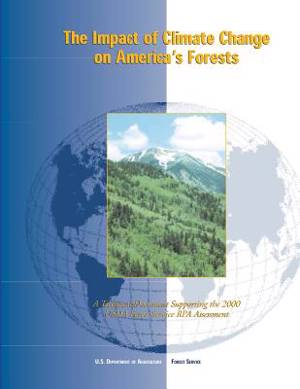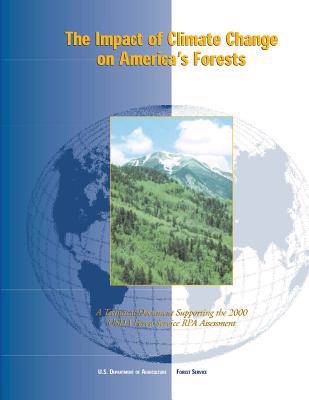
- Afhalen na 1 uur in een winkel met voorraad
- Gratis thuislevering in België vanaf € 30
- Ruim aanbod met 7 miljoen producten
- Afhalen na 1 uur in een winkel met voorraad
- Gratis thuislevering in België vanaf € 30
- Ruim aanbod met 7 miljoen producten
Zoeken
The Impact of Climate Change on America's Forests
A Technical Document Supporting the 2000 USDA Forest Service RPA Assessment
Forest Service
Paperback | Engels
€ 32,95
+ 65 punten
Omschrijving
The increasing concentration of atmospheric carbon dioxide has raised concern about the vulnerability of forests to potential changes in climate and climate variability. These concerns have prompted governments around the world to commission technical assessments on the impact of climate change on the environment and the economy. Based on the current scientific information within these assessments, governments have initiated negotiations on policy action to reduce greenhouse gas emissions and to address the vulnerabilities of the ecological, economic, and social systems to climate change. Critical to policy formulation is a periodic synthesis of the ever-expanding knowledge on forest ecology, the impact of climate on the forests and of forests on climate, forest management, the socio-economic value of trees and forests, and the role of forests in the global carbon cycle. The Forest Service conducts periodic assessments of the condition of forest and rangeland resources under the authority of the Renewable Resources Planning Act (RPA). The structure of these periodic assessments allows for the synthesis and integration of the current state of scientific knowledge. As part of the RPA process, this report synthesizes current information that assesses the impact of climate change on US forests. Six policy questions critical to understanding the impact of global climate change on current and future trends form the basis for this report. The first chapter describes mandates and structures of synthesizing scientific information on the forest sector, describes current understandings of the global climate, and closes with policy questions addressed in this assessment. The next chapters address the six policy questions of: what are the likely effects of increasing atmospheric carbon dioxide and prospective climate changes on ecosystem productivity, as measured by changes in net primary productivity?, to what geographic extent will potential ecosystem types change or move across the US, as measured in composition and boundary changes?, what changes in forest productivity will occur as measured by changes in volume, growth and biomass?, what are the potential impacts on the forest sector under climate change, as measured by employment and timber prices?, when forest policy questions for the RPA Assessment, such as reduced NFS harvest, are examined with and without climate change, do the forest sector impacts differ greatly in magnitude or kind?, and what are the opportunities and costs of emissions mitigation using forest ecosystem management and forest product technologies?
Specificaties
Betrokkenen
- Auteur(s):
- Uitgeverij:
Inhoud
- Aantal bladzijden:
- 138
- Taal:
- Engels
Eigenschappen
- Productcode (EAN):
- 9781480145993
- Verschijningsdatum:
- 19/10/2012
- Uitvoering:
- Paperback
- Formaat:
- Trade paperback (VS)
- Afmetingen:
- 216 mm x 280 mm
- Gewicht:
- 335 g

Alleen bij Standaard Boekhandel
+ 65 punten op je klantenkaart van Standaard Boekhandel
Beoordelingen
We publiceren alleen reviews die voldoen aan de voorwaarden voor reviews. Bekijk onze voorwaarden voor reviews.











